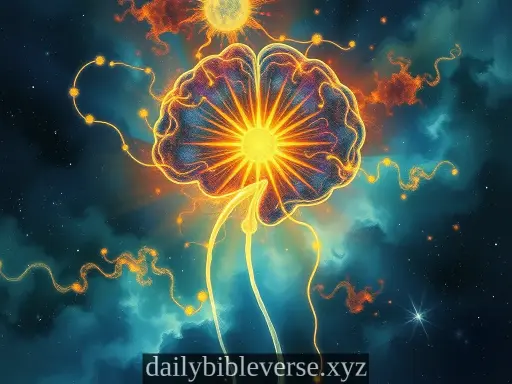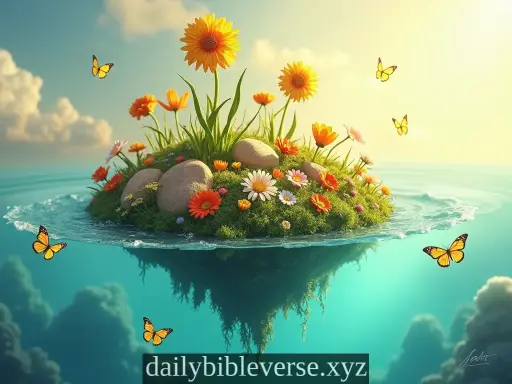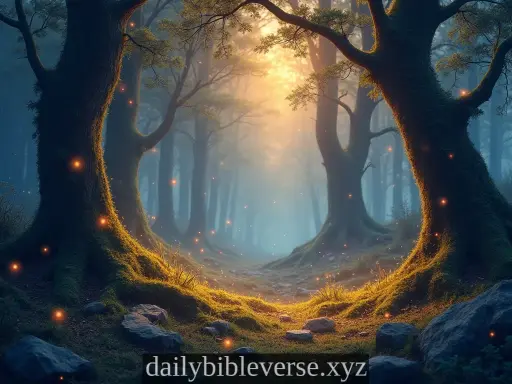Genesis 1-3: The Beauty of Creation and the Enigma of the Fall
Genesis 1-3: The Beauty of Creation and the Enigma of the Fall
Genesis 1-3 (NIV) Verse
In the beginning, God created the heavens and the earth. Now the earth was formless and empty, darkness was over the surface of the deep, and the Spirit of God was hovering over the waters. And God said, “Let there be light,” and there was light. God saw that the light was good, and he separated the light from the darkness. God called the light “day,” and the darkness he called “night.” And there was evening, and there was morning—the first day. (Genesis 1:1-5)
Now the serpent was more crafty than any of the wild animals the Lord God had made. He said to the woman, “Did God really say, ‘You must not eat from any tree in the garden’?” (Genesis 3:1)
Verse Exploration
The opening chapters of Genesis tell the story of God’s magnificent creation and the subsequent fall of humanity.
In Genesis 1, we see a God who brings order out of chaos, creating light, land, and life with a mere command.
The significance of this narrative lies not just in the act of creation but in the portrayal of God as a purposeful architect rather than a distant deity.
In a contemporary context, many individuals feel lost in chaos, whether it’s the tumult of modern life, relationships, or career challenges.
There’s a palpable sense of disorder that echoes the “formless and empty” state of the earth before creation.
But just as God created light out of darkness, we too can trust that our chaos can be transformed.
In Genesis 3, we encounter the pivotal moment of the fall when humanity chooses to disobey God’s command.
This moment serves as a powerful reminder of the consequences of our choices.
Much like Adam and Eve, we often find ourselves grappling with temptations that lead us astray from our intended path.
The themes of creation and fall resonate deeply with the human experience—each of us has moments of triumph and despair.
It urges us to question how we respond to chaos, temptation, and the inherent flaws that are part of our human condition.
Personal Connection
Reflecting on my own journey, I recall a time of immense uncertainty.
After graduating college, I was faced with the daunting task of finding a job in a rapidly changing economy.
It felt as though I was wandering in a dark, formless abyss, much like the earth described before God created light.
In those moments, I clung to my faith, reminding myself of the order that God brings from chaos.
Through prayer and reflection, I began to trust that, just like in the Genesis narrative, God was present and working even when I couldn’t see it.
During my search, I faced rejection after rejection.
Yet, it was God’s promise to bring light to my situation that kept me moving forward.
The clarity and opportunities I eventually received were not merely a product of my efforts but rather a manifestation of God’s faithfulness.
Just as Adam and Eve faced their choices, I confronted my temptations to give up.
As I stayed the course, I found purpose and direction.
This experience taught me that, like the narrative of Genesis, life is filled with moments of chaos transformed by faith into something beautiful.
It is an eternal reminder to trust in God’s creation and hope for better days ahead.
Historical Context
The Book of Genesis was written during a time when the Israelites were establishing their identity after years of slavery in Egypt.
They needed to understand their origins and the role of God in their lives.
By recounting the creation story, the authors aimed to convey the idea of a good and ordered world, affirming their own history as part of God’s plan.
This message is crucial as it echoes in the lives of so many today who seek meaning and purpose amidst societal upheaval.
The world we live in currently reflects chaos and confusion, similar to the “formless and empty” state before creation.
Many grapple with issues of identity, purpose, and morality, much like the Israelites did upon leaving Egypt.
By examining Genesis, we understand that chaos is not the end—just as God brought order from nothingness, He can do so in our lives as well.
The narrative serves as a reminder that even in the darkest moments, God is present and plans for restoration and reconciliation.
This understanding becomes increasingly relevant as we navigate through personal and collective challenges today.
Thematic Elements
Key themes in Genesis 1-3 include creation, chaos, light, and hope.
The theme of creation illustrates God’s desire for order, beauty, and purpose in life.
When He created the world, He took something chaotic and fashioned it into a cosmos filled with meaning.
In contrast, the theme of chaos highlights humanity’s propensity towards disobedience and the resulting ramifications of sin.
The “fall” of Adam and Eve is depicted through their choice to pursue knowledge independent of God, leading to their separation from divine fellowship.
The introduction of light versus darkness throughout the passages emphasizes hope.
Even in the aftermath of the fall, God’s promise of restoration shines brightly.
For readers today, navigating our own chaos is not without hope.
The narrative reassures us that light can emerge from our darkest decisions and situations.
When faced with trials, we can remember the cyclic nature of creation—how chaos can lead to rebirth.
By engaging deeply with these themes, we can draw strength and guidance for our personal journeys.
Literary Analysis
The literary style of Genesis combines narrative with powerful imagery, where metaphors elevate the text’s meaning.
The phrase “let there be light” is not merely a command; it is a profound statement of God’s sovereignty over darkness.
This imagery resonates deeply within our lives as we confront personal darkness.
Indeed, we often reflect upon moments of adversity as pivotal points of transformation.
The serpent in Genesis 3 is a powerful metaphor for temptation and deceit.
It leads to the pivotal fall, reminding us of our human vulnerability in the face of enticing choices.
The contrasts between light and darkness, obedience and disobedience, create a rhythm throughout the narrative.
This rhythm tells us that while chaos exists, so does the capacity for hope and renewal.
Intriguingly, Genesis uses simple yet evocative language that encourages readers to envision their own lives within the themes presented.
By exploring the imagery and style in Genesis 1-3, we understand the significance of each element in shaping our human experience.
Related Scriptures
1. John 1:1-5
In the beginning was the Word, and the Word was with God, and the Word was God. He was with God in the beginning. Through him all things were made; without him nothing was made that has been made. In him was life, and that life was the light of all mankind. The light shines in the darkness, and the darkness has not overcome it.
Connection: This scripture reflects the Genesis creation as it reiterates the theme of light overcoming darkness.
Relevance: It emphasizes that in our current lives, we are continually called to choose light over darkness.
2. Romans 8:28
And we know that in all things God works for the good of those who love him, who have been called according to his purpose.
Connection: This verse reassures us of God’s overarching plan amidst chaos.
Relevance: It serves to provide comfort during uncertain times, aligning with God’s promise in Genesis.
3. Revelation 21:5
He who was seated on the throne said, “I am making everything new!” Then he said, “Write this down, for these words are trustworthy and true.”
Connection: This verse illustrates the theme of renewal that echoes God’s creation act seen in Genesis.
Relevance: It reminds us that despite the occurrences of the fall, there is hope for a renewed creation.
4. 2 Corinthians 5:17
Therefore, if anyone is in Christ, the new creation has come: The old has gone, the new is here!
Connection: It connects directly to Genesis’ theme of restoration and new beginnings.
Relevance: It reassures believers that they can experience personal renewal through their faith.
5. Psalm 51:10
Create in me a pure heart, O God, and renew a steadfast spirit within me.
Connection: The plea for creation in the heart resonates deeply with the creative act of God in Genesis.
Relevance: This verse calls believers to seek God’s transformative experience in their lives today.
Practical Application
Here are some actionable steps you can take to apply the messages from Genesis 1-3 into your life:
- **Daily Reflection**: Consider areas in your life where you feel formless or chaotic. Reflect on how you can invite God into those situations for transformation.
- **Journaling**: Write about a moment when you felt lost or overwhelmed. How did you experience God’s presence or guidance during that time?
- **Community Engagement**: Discuss Genesis 1-3 themes in a group setting, fostering an open dialogue about creation, chaos, and renewal with friends or church members.
- **Prayer Practices**: Engage in specific prayers asking for clarity in your chaotic moments. Request God’s guiding light as you navigate choices in life.
- **Service Opportunities**: Volunteer in community service projects that promote restoration and help others find hope in chaos.
- **Meditate on Scriptures**: Take time daily to meditate on verses related to creation and renewal, allowing their messages to seep deeply into your life.
- **Create Art**: Use artistic expression (paint, write, knit) to embody the themes of creation in your personal life.
Encouragement and Hope
As we reflect on Genesis 1-3, let us find encouragement in the idea that chaos does not define us.
Instead, it is the light of God’s promises that illuminates our path.
Just as God spoke creation into existence, He continues to speak hope into our challenges.
For those who are feeling lost or burdened by circumstances, take heart.
God is at work in your life, crafting beauty from your trials.
Trust in His sovereignty and open your heart to the transformative power of His love.
Remember, your story is part of a grand narrative of creation and renewal within God’s kingdom.
You are not alone in your journey, for He is ever-present, working for your good.
Engagement Activity
Take a moment to write about a time when God transformed a chaotic situation into something beautiful in your life.
Reflect on what you learned from that experience and how it has shaped your understanding of God’s role as a creator.
Consider sharing this reflection with friends or family as a way to encourage one another.
Closing Prayer
Heavenly Father,
Thank you for the gift of creation and the promise of redemption.
In times of chaos, remind us of Your ever-present love and guidance.
Help us to embrace the hope and light that You offer, even when faced with challenges.
May our lives reflect Your beauty and grace in all circumstances.
In Jesus’ name, we pray, Amen.






